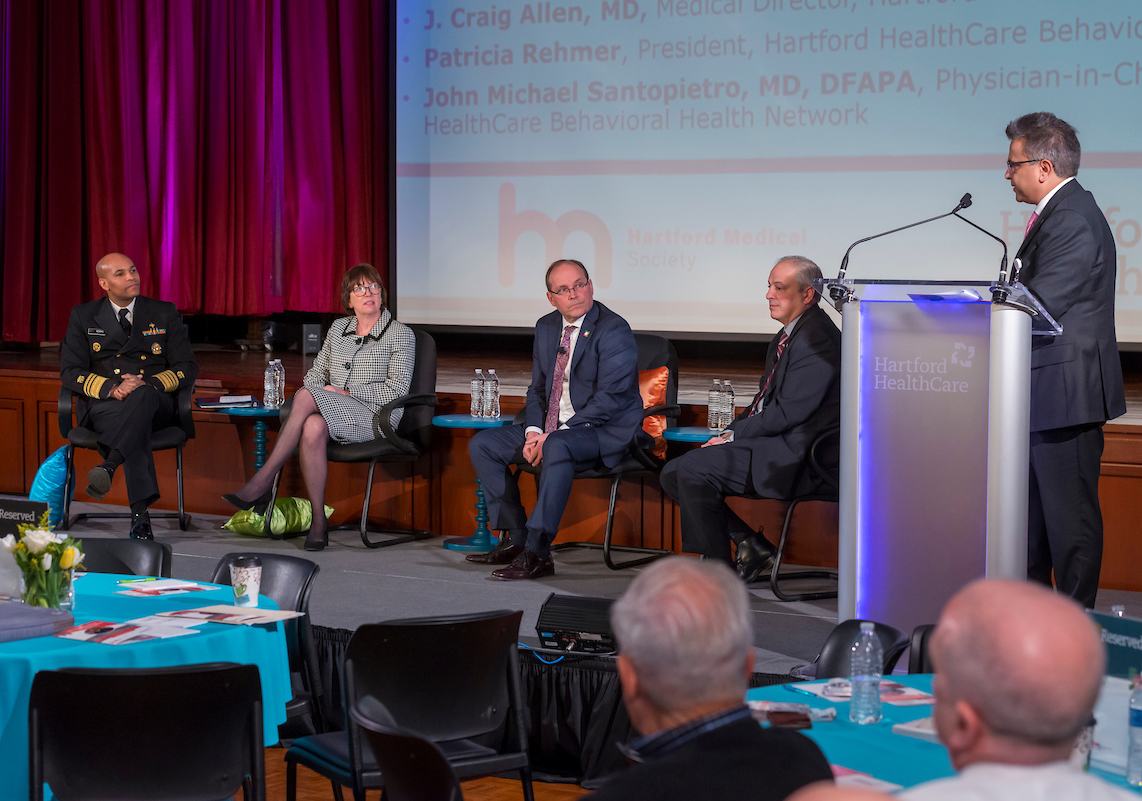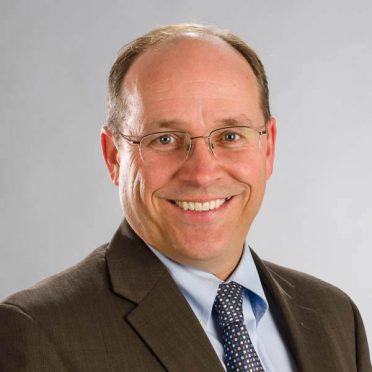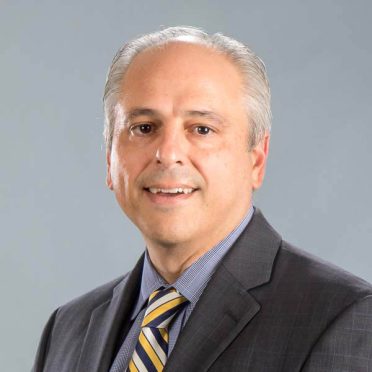Calling it “the defining issue of our time,” U.S. Surgeon General Jerome Adams, MD, MPH, invited healthcare providers to return to basics when addressing the nation’s opioid epidemic.
In Hartford March 2 as part of a presentation co-sponsored by the Hartford Medical Society and Hartford HealthCare (HHC), Dr. Adams said the key to pulling out of the epidemic will be to educate both providers and patients on effective pain management, empathize with the disease of addiction and dispel the stigma that still surrounds it.
“This is an opportunity to lean into things we’ve neglected for too long,” he told a roomful of healthcare providers. “If we want a more prosperous community, we need a healthier community.”
Noting that everyone has some connection to the crisis – his own brother is serving a 10-year prison sentence because of “opioid misuse” – Dr. Adams said it will take a united community to battle the issue, similar to his approach as Indiana state health commissioner during an HIV crisis.
“We built a community and forged and leveraged that partnership,” he said.
There are multiple layers to the epidemic that’s caused 1,200 deaths in Connecticut – there’s a need to reduce the number of opioids prescribed, but the underlying issue is pain management.
“Don’t brag about reducing the number of opioid prescriptions if you don’t do something else or you’ll have an epidemic of untreated pain,” he said. “You’ll be playing whack-a-mole.”
In the first Surgeon General’s Alert released in 13 years, Dr. Adams addressed the importance of educating people about the benefits of naloxone, the medication that counteracts opioid overdoses.
“How many people here know CPR?” he asked the audience, generating a sea of hands. “Good. Now how many people here carry naloxone?”
One woman raised her naloxone kit.
Dr. Adams said much like a spike in heart attacks triggered droves of Americans to learn CPR so they could help, people should be encouraged to pick up a free prescription of naloxone at any pharmacy to carry for emergencies.
“It’s important to let people know it’s safe and anyone can get it,” he said. “Take the free training. You have a role to play to dig us out of this hole.”
He offered five steps for responding to the opioid epidemic:
- Talk about it. Understanding opioids can help prevent misuse and overdose.
- Be safe. Take medications only as prescribed and store in a secure place.
- Understand pain. The country, Dr. Adams added, needs to “broaden the tool chest for providers to treat pain.”
- Know addiction. The right treatment can help people recover.
- Be prepared. Having naloxone can reverse overdose and save lives.
“Understand that there are bad choices but no one woke up this morning and decided to become a heroin addict,” he said. “We need to put people in the position to recover.”
In a panel discussion after Dr. Adams’ presentation, he pressed leaders of HHC’s Behavioral Health Network (BHN) to describe programs and initiatives to combat the opioid crisis locally.
“Healthcare happens in the community,” he said. “You need to reach people where they are.”
The discussion touched on:
- MORR. J. Craig Allen, MD, FASAM, vice president of Addiction Services for the BHN and medical director at Rushford, discussed the innovative Hartford HealthCare partnership with Meriden first responders through which certain opioid offenders are offered treatment instead of jail.
- Emergency Department recovery coaches. BHN President and HHC Senior Vice President Patricia Rehmer, MSN, ACHE, pointed to the placement of trained coaches, themselves recovering addicts, in every HHC emergency department. “It’s one thing for doctors to tell you to get treatment. It’s another thing for someone who understands what you’re going through and can say ‘I’ve been there,’” Dr. Adams said. “It’s critical we have those folks at those touchpoints.”
- Mental health first aid. BHN Physician-in-Chief Dr. John Santopietro, MD, DFAPA, said classes to educate the community about mental health needs and how to help broadens understanding and pushes back against stigma.
- Integrating behavioral health into primary care practices.
- Opioid Stewardship Council. This multidisciplinary group creates educational opportunities for providers and sends best-practice alerts through EPIC.
- Medication Assisted Treatment Close to Home (MATCH). The system offers 16 MATCH locations across the state as well as telehealth.
(In the photo above, from left, Dr. Adams, Rehmer, Dr. Allen, Dr. Santopietro and, at the podium, Ajay Kumar, MD, MBA, executive vice president and chief clinical officer for Hartford HealthCare.)
“This is an opportunity to not only put out the fire but to prevent the next fire,” Dr. Adams said, suggesting everyone in the audience “think about how you can lift up and build better partnerships so we’ll have better health.”
For more information on help for opioid use disorder at Rushford, click here. For information on the Hartford HealthCare Behavioral Health Network’s MATCH program, click here.



